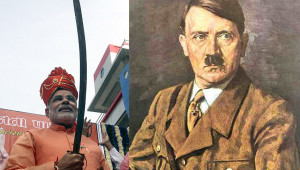
Without directly naming the Gujarat Chief Minister, Gandhi also alluded that Modi works like Nazi dictator Adolf Hitler and attacked him for retaining "corrupt" ministers in his state cabinet while talking tall of fighting corruption.
"What kind of chowkidari (guarding) is happening in Gujarat. Lakhs of acres of land are being taken away from the farmers and being given to industrialists. When farmers say something, their voice is ignored.
"Is stealing the land of farmers chowkidari. This is called theft and not chowkidari," Gandhi said addressing a rally in Balasinor, the first destination of his tour programme.
Modi has been saying in his rallies that he will work like a 'chowkidar' of the nation's treasury if BJP government came to power.
Seeking to draw a parallel between BJP's India Shining Campaign in 2004 Lok Sabha polls and its focus on Gujarat's development under Modi, Gandhi said it is being publicised in the whole country that Gujarat shines but its sheen is limited to few industrialists and the poor have not benefited from it.
BJP had lost the 2004 polls and the India Shining campaign of the NDA not going down well with the electorate was attributed as one of reasons.
Accusing BJP of taking credit for programmes initiated by Congress, Gandhi said in a sarcastic tone that the leaders of the Opposition party will claim after a decade that they had also brought MNREGA and Right to Food, the flagship programmes of Congress-led UPA.
"There are two kinds of leaders. The first type belongs to those who go among people, have some ideology and believe in the knowledge of people. He goes to them, asks them and learns from them. The thinking of this kind of leader is that it is the people who are repository of knowledge. Such a leader wants to understand people and has no pride.
"Then there is another kind of leader, whose best example is perhaps Hitler. Hitler thought there was no need to go to people. He believed entire knowledge of the world is only in his mind. That kind of leader only talks that he did this and that. That leader does not require to go to people," Gandhi said.
The Congress Vice President had in the past also compared Modi to Hitler





Comments
Add new comment